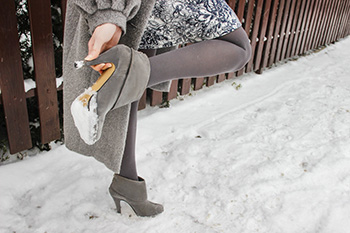
Wearing high heels during the winter can present unique challenges for the feet, toes, and ankles. The combination of slippery surfaces, icy sidewalks, and cold weather increases the risk of falls, frostbite, and strain on the lower extremities. Wearing high heels in winter often lead to instability, especially on ice-covered surfaces, which can cause sprains or fractures in the ankles. Also, the pressure on the forefoot from wearing high heels may increase discomfort, particularly when paired with reduced traction or improper footwear. Choosing footwear with features like closed toes, slip-resistant soles, and sturdy heel designs, such as block or wedge heels, can minimize these risks. Opting for styles with ankle support can further enhance stability while keeping feet warm and protected from snow and cold. A podiatrist can recommend proper winter footwear or address any pain caused by high heels. If you sustain a foot or ankle injury from wearing high heels, it is suggested that you schedule an appointment with a podiatrist for guidance.
High heels have a history of causing foot and ankle problems. If you have any concerns about your feet or ankles, contact one of our podiatrists from Cleveland Foot & Ankle Clinic. Our doctors can provide the care you need to keep you pain-free and on your feet.
Effects of High Heels on the Feet
High heels are popular shoes among women because of their many styles and societal appeal. Despite this, high heels can still cause many health problems if worn too frequently.
Which Parts of My Body Will Be Affected by High Heels?
- Ankle Joints
- Achilles Tendon – May shorten and stiffen with prolonged wear
- Balls of the Feet
- Knees – Heels cause the knees to bend constantly, creating stress on them
- Back – They decrease the spine’s ability to absorb shock, which may lead to back pain. The vertebrae of the lower back may compress.
What Kinds of Foot Problems Can Develop from Wearing High Heels?
- Corns
- Calluses
- Hammertoe
- Bunions
- Morton’s Neuroma
- Plantar Fasciitis
How Can I Still Wear High Heels and Maintain Foot Health?
If you want to wear high heeled shoes, make sure that you are not wearing them every day, as this will help prevent long term physical problems. Try wearing thicker heels as opposed to stilettos to distribute weight more evenly across the feet. Always make sure you are wearing the proper shoes for the right occasion, such as sneakers for exercising. If you walk to work, try carrying your heels with you and changing into them once you arrive at work. Adding inserts to your heels can help cushion your feet and absorb shock. Full foot inserts or metatarsal pads are available.
If you have any questions please feel free to contact our offices located in Cleveland, Independence, and Kent, OH . We offer the newest diagnostic and treatment technologies for all your foot and ankle needs.
